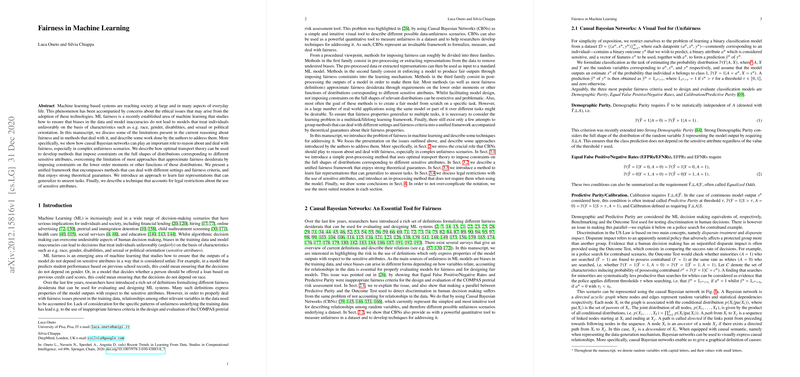Fairness in Machine Learning
The paper by Luca Oneto and Silvia Chiappa addresses significant challenges in ensuring fairness within ML systems. This work is rooted in the context of the increasing proliferation of ML-based systems in decision-making processes across various societal facets. As such, the paper focuses on potential ethical issues stemming from biases in data and model inaccuracies that could lead to unfair treatment of individuals based on sensitive attributes such as race, gender, or political orientation.
Key Contributions
The authors provide a comprehensive discussion on several mechanisms and frameworks for addressing fairness, with notable emphasis on causal reasoning, distributional fairness, and multitask learning:
- Causal Bayesian Networks (CBNs): The paper highlights the crucial role of CBNs in identifying and reasoning about unfairness in ML systems. Understanding the data-generation process and the potential unfair causal pathways helps in avoiding the application of inappropriate fairness criteria. CBNs facilitate both visual and quantitative analysis of data, enabling the measurement of unfairness and the development of mitigation strategies.
- Optimal Transport for Fairness: The authors present an innovative method using optimal transport theory to impose fairness constraints. This approach aims at matching distributions of outputs corresponding to different sensitive attributes, addressing limitations of methods that typically impose constraints only on lower-order statistical moments. The strong theoretical guarantees associated with this approach offer a robust framework for ensuring fairness.
- Unified Frameworks: The paper introduces a generalized empirical risk minimization framework that enforces fairness constraints, offering a broad application across various settings such as regression, classification, and different types of sensitive attributes. This framework provides theoretical consistency guarantees, addressing a critical need for generalizable fairness solutions.
- Learning Fair Representations: Recognizing the importance of generalization in ML, the authors propose techniques for learning fair representations through multitask learning frameworks. This approach ensures that fairness properties are preserved across multiple tasks, paving the way for models that can adapt to new data without compromising fairness.
- Legal Considerations and Sensitive Attributes: Finally, the paper discusses methods that comply with legal restrictions concerning the explicit use of sensitive attributes in model deployment. This involves using proxy variables and innovative training mechanisms to achieve fairness without direct reliance on sensitive information.
Implications and Future Directions
The paper’s insights have several practical and theoretical implications:
- The application of CBNs can significantly enhance the understanding of data unfairness, leading to better model design and evaluation.
- By leveraging distributional approaches, such as optimal transport, the ML community can develop more rigorous and reliable fairness metrics.
- The development of frameworks that provide guarantees on fairness and effectiveness across tasks is critical for the deployment of ethical AI systems.
- Ensuring that fairness is maintained in real-world applications where models are frequently reused and adapted presents a continuing challenge.
Looking forward, integrating temporal dynamics into fairness evaluations could be a promising area for future research. Such integration could help in understanding the long-term effects of decisions made by ML systems, thus promoting truly equitable outcomes over time.
In summary, the paper provides a substantive contribution to the discourse on fairness in machine learning, highlighting the complexity of the problem and proposing architectures, methods, and frameworks to guide researchers and practitioners in achieving fairer AI systems.
